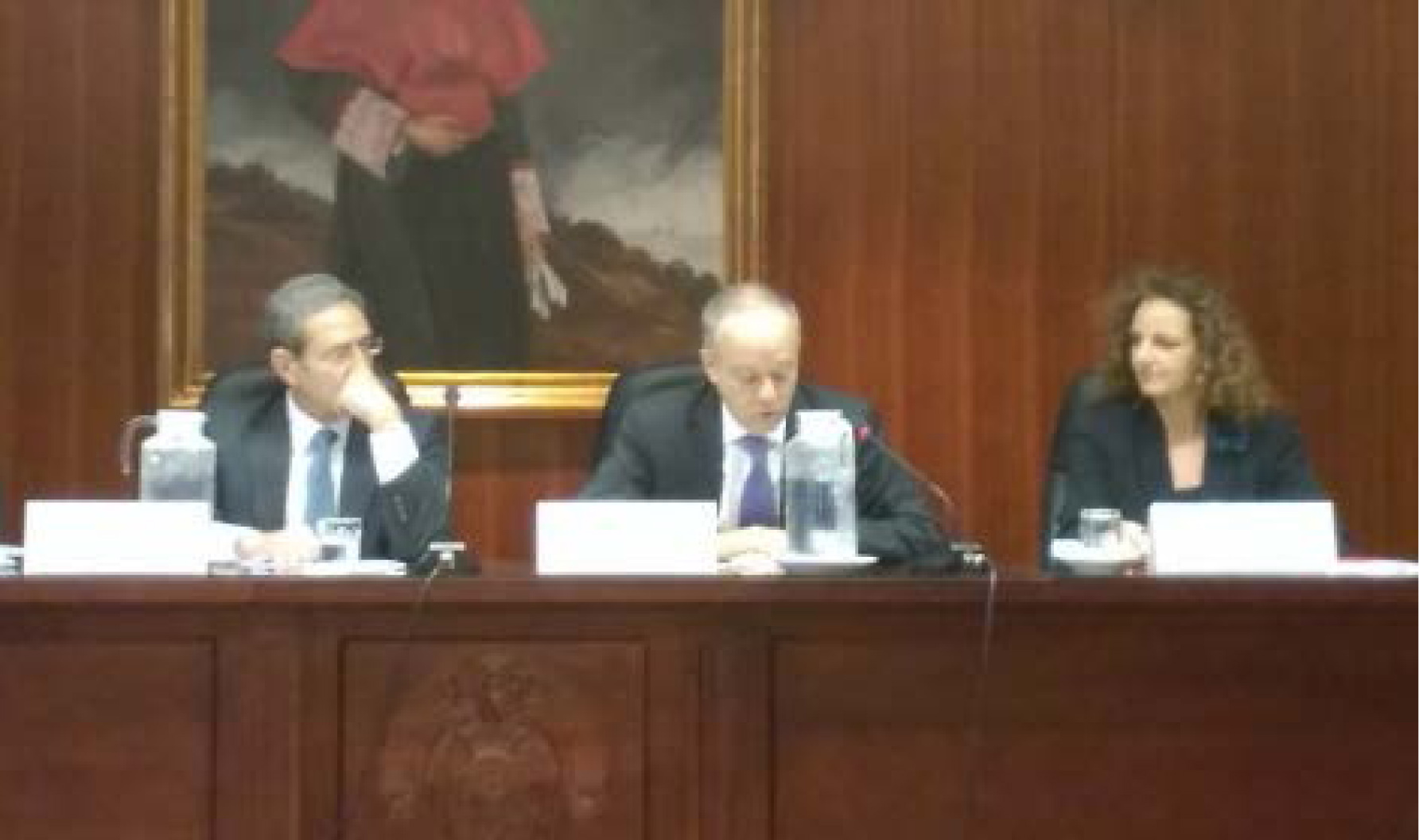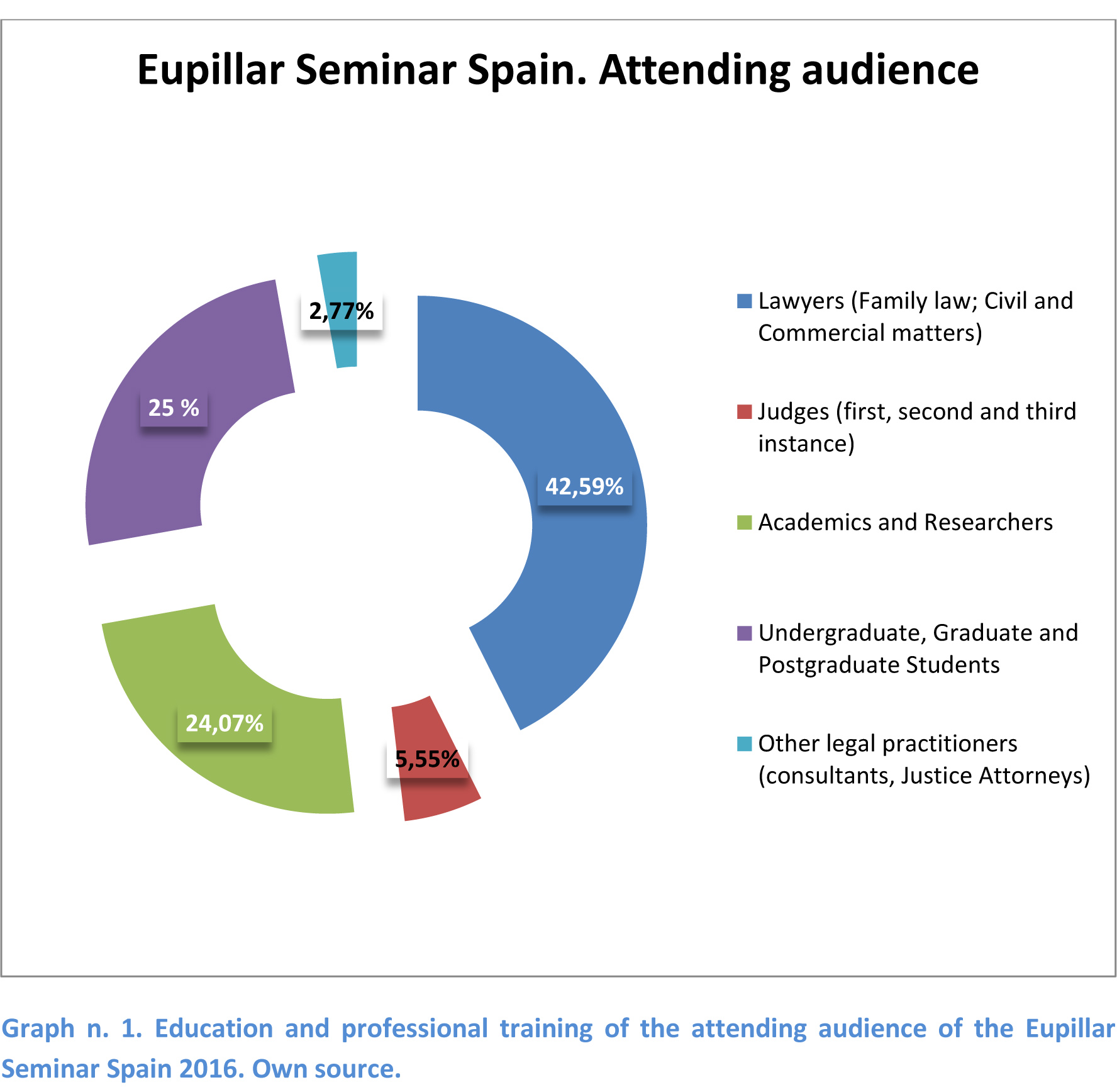Eupillar seminar UCM 2016
-1.jpg)
The 2016 Eupillar seminar, Civil Justice in the European Union: assessment of the Spanish experience and future prospects was held the 2nd of June 2016 at the Conference Room of the Faculty of Law at Complutense University of Madrid.
Opening session
Dr. Ricardo Alonso García, Dean of the Faculty of Law UCM, Ds. Carmen Otero García-Castrillón, principal researcher of the Eupillar Project in Spain and H. E. Mr. Francisco Marín Castán, president of the First Chamber of the Supreme Court, participated in the opening ceremony. Mr. Marín Castán pronounced the inaugural conference Experience of the Supreme Court in the application of the European Private International Law instruments.
The following issues were raised:
Dissemination of the first results of the research developed at UCM in the context of the Eupillar project:
-
National legal practitioners have not a sufficient understanding of the European Private International Law instruments.
-
The legal concepts included in the European Regulations of Private International Law (PIL) are difficult to interpret.
-
The procedural rules of the Member States need adaptations.
-
The number of cross-border litigation cases in Spain has increased.
-
The application of the European Private International Law instruments has experienced a gradual improvement.
Slide show (PDF):
-
Carmen Otero García-Castrillón: Eupillar project. First results.

Opening session. From left to right, H.E. Mr. Francisco Marín Castán, Dr. Ricardo Alonso García, Dean of the Faculty of Law UCM, and Ds. Carmen Otero García-Castrillón, principal researcher of the Eupillar project in Spain.
Experience of the Supreme Court in the application of the European Private International Law instruments:
-
In Family Law issues, the parties tend to employ procedural strategies (for example, the time the divorce application is introduced) to choose the most beneficial jurisdiction.
-
Some legal lacunae exist in the European Regulations of PIL. For example, as to the recognition and enforcement of foreign court decisions, the Supreme Court can estimate the forfeiture of an enforcement action according to national law because Council Regulation (EC) No 44/2001 of 22 December 2000 (Brussels I) do not specify a particular deadline.
-
The Supreme Court includes references to the ECJ jurisprudence in its decisions. When not applicable, they are mentioned for illustrative purposes or to strengthen the judicial argumentation.
-
The most common references to the European PIL instruments included in the judgements of the Supreme Court are Brussels I, Brussels II, Rome I and Rome II (in that order).
-2.jpg)
From left to right, Professor Carmen Otero García-Castrillón, Mr. Francisco Marín Castán, Judge of the Supreme Court, and Dr. Ricardo Alonso García, Dean of the Faculty of Law UCM.
First session: Cross-border litigation in civil and commercial matters: procedural issues
The session was chaired by the lawyer and Procedural Law Professor Ignacio Díez-Picazo. The speakers were Mr. Javier Casado, Justice Attorney and member of RESEJ (Spanish Association of Justice Attorneys), Mr. Álvaro López de Argumedo, lawyer of Uría Menéndez, and Dr. Fernando Gascón Inchausti, Associated Professor of Procedural Law at UCM.
The following conclusions were presented:
-
Legal practitioners are not sufficiently trained in cross-border litigation issues concerning civil and commercial matters. A more specialized knowledge of PIL is required in order to facilitate international cooperation.
-
The payment of fees and the practice of court proceedings cause additional difficulties for the implementation of cross-border civil justice, particularly in the notifications field.
-
Multi-tier clauses can ease a progressive resolution of legal disputes (negotiation, mediation, arbitration and litigation). These clauses are commonly admitted in United States and in Spain but discussed in some EU member States.
-
Recognition and enforcement of EU member States court decisions works well.
-
The most common grounds for refusing/suspend the recognition or the enforcement of a EU member State’s court decision in Spain are not public policy or default of appearance by the respondent but the lack of a correct translation of the judgement.
-4.jpg)
Civil and commercial matters session. From left to right, Mr. Javier Casado, Dr. Fernando Gascón, Dr. Ignacio Díez-Picazo and Mr. Álvaro López de Argumedo.
Slide shows (PDF):
-
Javier Casado Román: Experience of the Spanish courts in cross-border litigation cases: some challenges and controversial questions.
-
Álvaro López de Argumedo:Procedural strategies in cross-border litigation in civil and commercial matters; the importance of choice of court agreements.
Second session: Law applicable in cross-border litigation in civil and commercial matters
The session was chaired by Mr. Guillermo Palo, Vice-Rector and Professor of Private International Law at the University of Valencia. Speakers Manuel Ortiz, Judge of the Valencia Superior Court of Justice, and private international law professors Dr. Elisa Torralba, (Autonoma University) and Dr. Laura Carballo (University of Santiago de Compostela).
The following statements were made:
-
The volume of PIL subjects is not sufficient in the lists of topics for the examination of judges in Spain.
-
Judges find it difficult to interpret the European Regulations due to their poor knowledge of foreign languages and some unclear translations of the legal documents. This leads to a “nationalization” of the European concepts included in the Regulations.
-
The proof of foreign law is still a problem for the correct application of the conflict-of-law rules. The proof of foreign law is too expensive for the parties.
-
There is a tendency to apply national law to cross-border cases that should be resolved according to foreign law.
-
The parties resort to “forum shopping” with the purpose of choosing the more beneficial law.
-7.jpg)
Second session on civil and commercial matters. From left to right, Judge Mr. Manuel Ortiz, Professor Dr. Elisa Torralba, Professor Dr. Guillermo Palao and Professor Dr. Laura Carballo.
Slide show (PDF):
-
Manuel Ortiz Romaní: Experience of the Spanish judicature in the determination of the law applicable.
Third session: Matrimonial crisis
The session was chaired by Dr. Cristina de Amunátegui, Professor of Civil Law at UCM. The speakers were Dr. Cristina González Beilfuss, Professor of PIL at the University of Barcelona and legal counselor of REJUE (Spanish Judicial Network of International Cooperation), Ms. Elena Zarraluqui, associated member of Zarraluqui Lawyers and member of AEAF (European Association of Family Law lawyers) and Dr. Andrés Rodríguez Benot, Professor of PIL at UPO (Seville) and member of the Expert Group of the Directorate General of Justice and Consumers on the revision of the Regulation 2201/2003.
The rapporteurs made the following comments:
-
In Spain, the Regulations are applied to expatriate nationals, nationals of third countries who are resident in Spain and Spanish nationals who are resident in other Member States or in third countries.
-
There is an increase in the number of divorce cases in which only one of the spouses is resident in Spain. The practice of notifications in other Member States is complicated.
-
The European Regulations include too many alternative forums and enable the practice of “forum shopping”.
-
The definition of some concepts included in the European Regulations as “habitual residence” or “domicile” need to be clarified.
-
To enhance specialization, the attribution of cross-border family law cases should correspond to the Family law courts of the provincial capitals.
-5.jpg)
Session on matrimonial crisis. From left to right, Dr. Andrés Rodríguez Benot, Dr. Cristina González Beilfuss, Dr. Cristina de Amunátegui and Ms. Elena Zarraluqui.
Fourth session: Minors
The session was chaired by Dr. Julio A. García, Professor of PIL at UCM. The speakers were Ms. Emelina Santana, Judge of the First Instance Court n. 79 of Madrid and member of REJUE, Mr. Alberto Pérez Cedillo, lawyer and solicitor of England and Wales, and Ds. Elena Rodríguez Pineau, Vice-Dean of International Relations and Associated Professor of PIL at Autonoma University.
The following questions were raised:
-
The prorogation of jurisdiction of art. 12 of Council Regulation (EC) No 2201/2003 of 27 November 2003 (Brussels IIa) must be interpreted in a restrictive way in order to guarantee the best interests of the child.
-
The Spanish Law on voluntary jurisdiction constitutes a step forward in terms of international child abduction matters. It introduces mediation options and enhances the communication between the judges of the Member States by means of networks of international judicial cooperation.
-
Council Regulation (EC) No 4/2009 of 18 December 2008 (Brussels III) has entered into force recently but its implementation is complicated. The law applicable is not determined by means of a single legal instrument (Brussels III Regulation, The Hague Protocol on the Law applicable to Maintenance obligations (concluded 23 November 2007), the Hague Convention on the Law applicable to Maintenance obligations (concluded 2 October 1973).
-
Brussels III Regulation and The Hague Protocol strengthen the role of central authorities when guaranteeing maintenance obligations in cross-border Family law cases.
-
Spanish central authorities are the requesting party only in the 5% of the child abduction cases occurred in the UE Member States.
-6.jpg)
Session on minors with the rapporteurs -from left to right- Ds. Elena Rodríguez Pineau and Ms. Emelina Santana, the chairman Dr. Julio A. García and Mr. Alberto Pérez Cedillo.
Attending audience:
A total of 108 legal practitioners attended the seminar among judges, lawyers, academics, undergraduate, graduate and postgraduate students. Their distribution is presented below:

Picture credits: Eupillar Seminar Spain 2016. By Samia Benaissa Pedriza and Clara Cordero Álvarez
